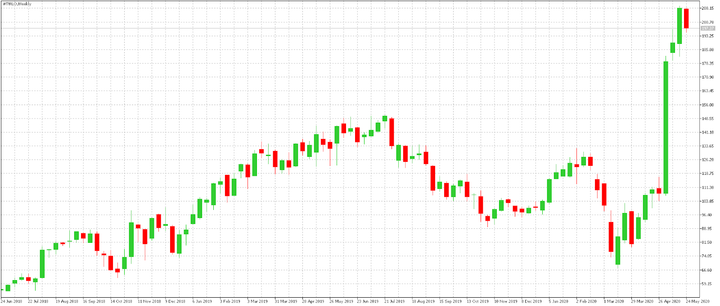Work-From-Home Stocks - Room To Run Or Due For Correction?
The massive market sell-off and subsequent rebound in the wake of the coronavirus shutdown masked multiple different market movements - airlines, travel and banks tanked; large-cap tech (primarily the FANGs) dipped and then recovered with many setting new highs; and a select group of companies servicing the Work-From-Home (WFH) movement surged (most notably Zoom, which is up 260% for the year).
According to FirstRate Data, there has been a tenfold increase in customer demand for analytics on WFH stocks, with the central question being: should the rally in WFH stocks be chased or are they overextended and due for a correction?
Work-From-Home stocks - a low-risk investment opportunity?
Before considering the likely direction of the WFH stocks it is worth noting that these now exhibit the very interesting property of low (or even negative) betas. Beta is a measure of how volatile a stock is in relation to the broader market - with higher risk stocks having betas above one and low-risk stocks such as utilities having betas below one.
Traditionally mid-cap tech stocks such as the WFH stocks would have very high betas, often close to 2, meaning the returns of these stocks are expected to be a multiple of the returns on the broader index. Since the Covid-19 crisis, however, these stocks are moving contrary to the broader indices and so have low betas often associated with low-risk stocks such as utilities.
For an investor holding a portfolio of diversified stocks, this means the stocks can be added to the portfolio and provide additional returns whilst at the same time reducing portfolio volatility (note that these low betas are likely a temporary phenomenon and would be unlikely to last over six months).
Are Work-From-Home stocks already overbought?
In terms of technicals, most WFH stocks look very stretched - for example, the stochastic oscillator for Zoom (ZM), Slack (WORK), Peloton (PTON) and Shopify (SHOP) are all above 80, indicating the stocks are extremely overbought. In addition, there is significant headline risk in the WFH cohort, note the 5-10% selloff on the mildly optimistic news of an early-stage vaccine in mid-May.
Fundamentals look even more precarious - valuations have already priced in dramatic growth and these companies will need to demonstrate extremely strong revenue growth to justify their valuations. For example, Zoom currently trades at a valuation of 66 times its sales, when a typical tech company would be expected to be 10-15 times sales.
It, therefore, appears that much of the hyper-growth from COVID-19 is already priced into the WFH stocks and risk is to the downside.
Opportunities for the second wave Work-From-Home movement
However, there is still significant opportunity in companies that will benefit from second-order effects of the WFH movement - i.e. companies that provide services to the 'core' WFH companies. These companies are typically technology vendors, supplying the key infrastructure components that the WFH companies rely on.
Many of these stocks are just beginning to be recognized now as the core WFH stocks were previously the primary focus of investor's attention. For example, Splunk (SPLK) (which provides a data-analytics service) had seen its stock price only recover to pre-COVID levels by mid-May, however, its stock surged 12% after it's May 21 earnings release when it provided strong guidance due to onboarding key customers such as Zoom and Shopify.
Similarly Twilio (TWLO) surged 30% after it announced increased demand from telehealth and tech-education companies.

Source: Admiral Markets MT5 with MT5-SE Add-on #TWLO Weekly chart (between 24 Jun 2018 and 27 May 2020). Accessed: 27 May 2020, at 9:00am EEST - Please note: Past performance is not a reliable indicator of future results, or future performance.
There are numerous tech stocks still to report which are likely to benefit significantly from second-order effects of WFH whose stock has not seen a dramatic increase, such as ZenDesk (ZEN) which provides customer support tech for websites, RingCentral (RNG) which provides cloud-based communications solutions, SolarWinds (SWI) which proxies network monitoring technology.
Whilst the WFH rally may have further to run the risks of a major downside correction are mounting, there is still significant value in stocks of companies providing the infrastructure for the core WFH companies.
Disclaimer: The given data provides additional information regarding all analysis, estimates, prognosis, forecasts or other similar assessments or information (hereinafter "Analysis") ...
more


